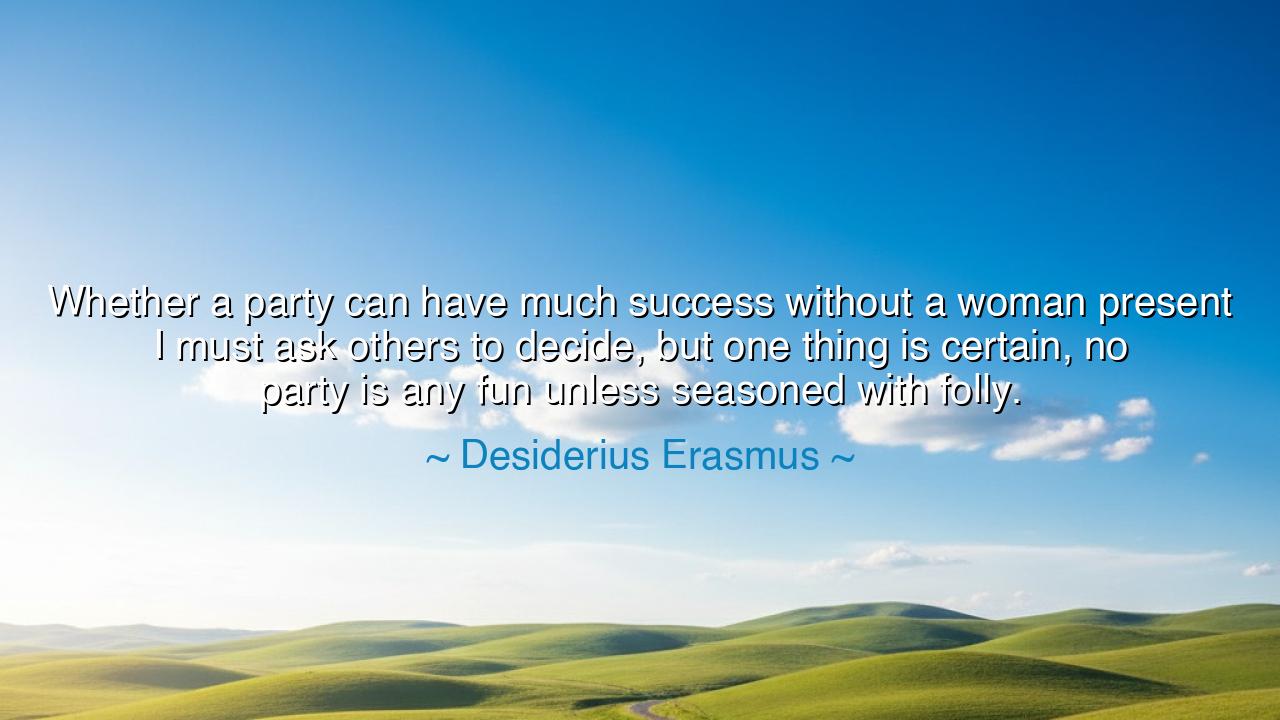
Whether a party can have much success without a woman present I
Whether a party can have much success without a woman present I must ask others to decide, but one thing is certain, no party is any fun unless seasoned with folly.






Hear the playful yet profound words of Desiderius Erasmus, the great humanist of the Renaissance: “Whether a party can have much success without a woman present I must ask others to decide, but one thing is certain, no party is any fun unless seasoned with folly.” At first glance, his words appear light, even whimsical, yet beneath them lies a deeper truth. He speaks not only of gatherings, but of the nature of human joy, of the need for folly—a touch of mischief, laughter, and freedom—to breathe life into our solemn lives.
The ancients themselves knew this truth. The Greeks celebrated Dionysus, the god of wine, theater, and ecstatic folly. In his festivals, men and women set aside their rigid roles, laughed, sang, and played. They understood that life chained only to reason grows heavy and dull, but life seasoned with joy becomes a feast. Erasmus, though a scholar of reason and order, echoes this ancient wisdom: seriousness builds structures, but folly makes them worth inhabiting.
Consider the tale of the Feast of Fools in medieval Europe. On this day, the people turned the world upside down: peasants dressed as bishops, jesters mocked kings, and solemn ceremonies were parodied with laughter. Though the Church often frowned upon it, the people knew such folly was necessary. It released tension, restored balance, and reminded all that even the highest dignitaries were still human. Without folly, gatherings would be stiff, lifeless shells; with it, they were transformed into vibrant celebrations.
In his words, Erasmus also points to the role of women, though half in jest. In his time, gatherings of men—political, academic, or clerical—were common, but he hints that such assemblies lacked a vital presence. Whether for balance, charm, or the liveliness women often bring, he implies that the party incomplete is one without them. Yet he quickly shifts the heart of his lesson: even beyond questions of presence or absence, what truly defines joy is folly—that spark of play that frees us from chains of pretense.
What then is folly? It is not destructive chaos, nor the reckless abandonment of wisdom. It is the light-hearted spirit, the willingness to laugh at oneself, the courage to dance even when the world grows heavy. Erasmus himself wrote In Praise of Folly, a book where he used humor and satire to expose the pride of kings and priests. He proved through folly what reason alone could not: that laughter has power to reveal truth and to heal wounds of the spirit.
To you who hear this, take the lesson into your heart: do not despise folly. In your labors, be diligent; in your studies, be disciplined; but in your gatherings, let there be laughter, let there be joy, let there be lightness. A life without folly becomes brittle, like clay left to dry and crack. But a life with folly is supple, enduring, and filled with music. Allow yourself, at times, to be foolish, for in foolishness there is freedom.
Practical wisdom follows: at your feasts, do not let pride or stiffness rule. Invite not only food and drink, but humor, play, and song. In your friendships, allow space for jest, for it binds hearts more tightly than ceremony. And in your life, remember that even wisdom itself may wear the mask of folly, for often truth is best delivered with a smile rather than a sermon.
Thus, remember Erasmus’ words: “No party is any fun unless seasoned with folly.” For the measure of joy is not in wealth, nor in ceremony, but in the laughter that lightens the soul. Let your life be a banquet, richly seasoned with both wisdom and folly, so that when others sit at your table, they leave not only nourished, but alive with joy.






AAdministratorAdministrator
Welcome, honored guests. Please leave a comment, we will respond soon